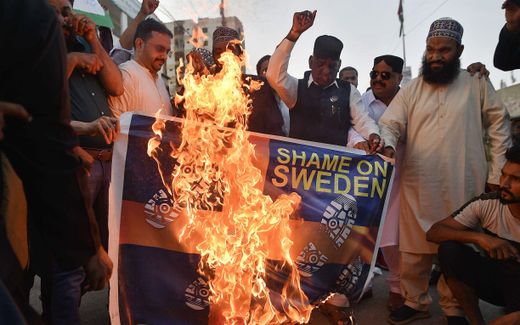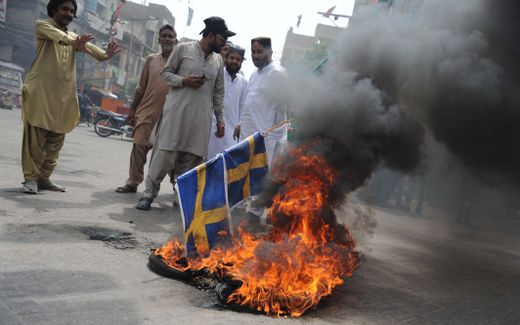While the West advoctates freedom of speech, the UN condemns Quran burnings

Salwan Momika protests outside a mosque in Stockholm. Photo EPA, Stefan Jerrevang
European Union
On Wednesday, a divided United Nations Human Rights Council condemned the recent Quran burnings in Sweden. Analysts say this is a defeat for Western countries, which stand up for freedom of expression.
Pakistan had tabled the resolution on behalf of the 57 Organisation of Islamic Cooperation (OIC) countries. It calls on the UN human rights chief to publish a report on religious hatred. It also urges member states to step up efforts to combat such manifestations.
The move is a direct response to the burning of a Quran in Sweden at the end of June. An Iraqi refugee then set fire to the Muslim holy book at a mosque in the capital Stockholm at the beginning of the Feast of Sacrifice. This sparked outrage across the Muslim world, especially as the Swedish police had permitted the action.
Pain
"It is important to understand the deep pain that a public and deliberate violation of the Quran causes Muslims. It is an attack on their faith," Pakistan Foreign Minister Bilawal Bhutto Zardari addressed the Human Rights Council.
The resolution condemning "religious hatred" was passed with 28 votes in favour, 12 against and seven abstentions. Those voting against it included France, Germany, and the US. Ukraine voted in favour. Belgium voted against it on behalf of the European Union.
Western countries rejected the burning of the Quran but at the same time, strongly opposed the proposal. For them, the current resolution would compromise free speech. French ambassador Jerome Bonnafont articulated the sentiment: "Human rights protect people. Not religions, doctrines, beliefs or their symbols."
According to the US, it was possible to reach a unanimous agreement on a resolution if it had taken a little longer. "Unfortunately, our concerns have not been taken seriously," Ambassador Michele Taylor declared. "I am truly deeply saddened that this council failed to speak out unanimously against what we all find reprehensible anti-Islamic acts of hatred while also respecting freedom of expression."
Lip service
Meanwhile, Pakistan's UN ambassador criticised the countries that voted against it. "Unfortunately, some countries have chosen to abdicate their responsibility to prevent and fight the scourge of religious hatred," Khalil Hashmi said. He says Western commitment to countering religious hatred is only "lip service".
Analysts interpret the outcome of the vote as a defeat for Western countries in the council. "They are losing more and more support and losing the argument," Marc Limon, director of the Geneva-based Universal Rights Group, told the Reuters news agency. With 19 voting members, the OIC has unprecedented influence in the council.
At the Council's session, the World Evangelical Alliance and the World Council of Churches condemned the recent Quran burnings. "Any hostility against Muslims or other religious communities are incompatible with our Christian values." The Christian organisations appealed to the people who want to protect freedom of expression and freedom of religion, to engage in dialogue. "We need to work together to promote a shared understanding of how our increasingly pluralistic societies can be tolerant and flourishing."
The Human Rights Council was created by the UN in 2006 to monitor compliance with human rights treaties. The council has 47 rotating members. It usually holds three regular sessions a year. The second session of 2023 began in mid-June and continues until the end of next week.
Related Articles








